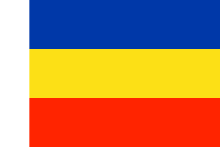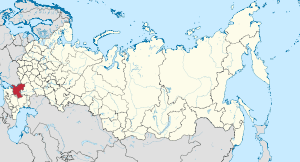Rostov Oblast
| Rostov Oblast Ростовская область (Russian) | |||
|---|---|---|---|
| — Oblast — | |||
| |||
|
| |||
| |||
|
| |||
| Political status | |||
| Country | Russia | ||
| Federal district | Southern[2] | ||
| Economic region | North Caucasus[3] | ||
| Established | September 13, 1937[4] | ||
| Administrative center | Rostov-on-Don | ||
| Government (as of August 2014) | |||
| • Governor[5] | Vasily Golubev[6] | ||
| • Legislature | Legislative Assembly | ||
| Statistics | |||
| Area (as of the 2002 Census)[7] | |||
| • Total | 100,800 km2 (38,900 sq mi) | ||
| Area rank | 32nd | ||
| Population (2010 Census)[8] | |||
| • Total | 4,277,976 | ||
| • Rank | 6th | ||
| • Density[9] | 42.44/km2 (109.9/sq mi) | ||
| • Urban | 67.2% | ||
| • Rural | 32.8% | ||
| Population (January 2013 est.) | |||
| • Total | 4,254,600[10] | ||
| Time zone(s) | MSK (UTC+03:00)[11] | ||
| ISO 3166-2 | RU-ROS | ||
| License plates | 61, 161 | ||
| Official languages | Russian[12] | ||
| Official website | |||
Rostov Oblast (Russian: Росто́вская о́бласть, tr. Rostovskaya oblast; IPA: [rɐˈstofskəjə ˈobləsʲtʲ]) is a federal subject of Russia (an oblast), located in the Southern Federal District. The oblast has an area of 100,800 square kilometers (38,900 sq mi) and a population of 4,277,976 (2010 Census),[8] making it the sixth most populous federal subject in Russia. Its administrative center is the city of Rostov-on-Don, which also became the administrative center of the Southern Federal District in 2002.
Geography
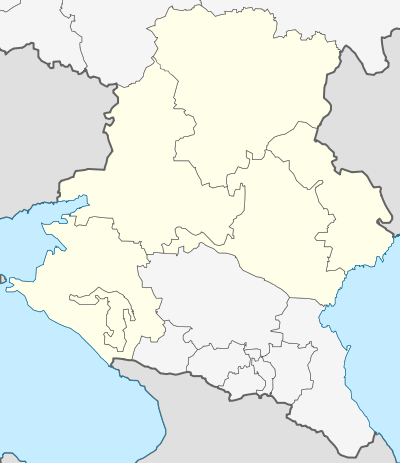
stan
*Smaller areas along the north Caucasus are the republics: Karachay-Cherkessia, Kabardino-Balkaria, North Ossetia-Alania, Ingushetia, and Chechnya
*Yellow is the Southern Federal District and Pink is the North Caucasus Federal District
Rostov Oblast borders Ukraine and also Volgograd and Voronezh Oblasts in the north, Krasnodar and Stavropol Krais in the south, and the Republic of Kalmykia in the east.
It is within the Russian Southern Federal District.
Rivers and lakes
The Don River, one of Europe's largest rivers, flows through the oblast for part of its course. Lakes cover only 0.4% of the oblast's area.
Administrative divisions
Demographics
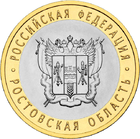
Population: 4,277,976 (2010 Census);[8] 4,404,013 (2002 Census);[13] 4,308,654 (1989 Census).[14]
- Vital statistics for 2012
2009 - 1.38 | 2010 - 1.38 | 2011 - 1.39 | 2012 - 1.51 | 2013 - 1.52 | 2014 - 1.61 | 2015 - 1.62(e)
Ethnic groups: Residents identified themselves as belonging to 157 different ethnic groups, including twenty-seven of more than two thousand persons each. The most important ethnicities are[8] the 3,795,607 ethnic Russians (90.3%); the 77,802 ethnic Ukrainians (1.9%); the 110,727 ethnic Armenians (2.6%). Other important groups are the 35,902 Turks (0.9%); 16,493 Belarusians (0.4%)); 13,948 Tatars (0.3%); 17,961 Azeris (0.4%); 11,449 Chechens (0.3%); 16,657 Roma (0.4%); 11,597 Koreans (0.3%); and 8,296 Georgians (0.2%). There were also 76,498 people (1.8%) belonging to other ethno-cultural groupings. 76,735 people were registered from administrative databases, and could not declare an ethnicity. It is estimated that the proportion of ethnicities in this group is the same as that of the declared group.[17]
Religion
According to a 2012 official survey[18] 49.5% of the population of Rostov Oblast adheres to the Russian Orthodox Church, 6% are unaffiliated generic Christians, 1% are either Orthodox Christian believers who don't belong to church or are members of other (non-Russian) Orthdox bodies, 1% are Muslims, and 1% are adherents of the Slavic native faith (Rodnovery) movement. In addition, 26% of the population declares to be "spiritual but not religious", 12% is atheist, and 3.5% follows other religions or did not give an answer to the question.[18]
Economy
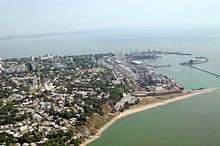
Major industries of Rostov Oblast are agriculture, agricultural industry, food processing, heavy industry, coal and automobile manufacture.
Culture
References
- ↑ Law #30-ZS
- ↑ Президент Российской Федерации. Указ №849 от 13 мая 2000 г. «О полномочном представителе Президента Российской Федерации в федеральном округе». Вступил в силу 13 мая 2000 г. Опубликован: "Собрание законодательства РФ", №20, ст. 2112, 15 мая 2000 г. (President of the Russian Federation. Decree #849 of May 13, 2000 On the Plenipotentiary Representative of the President of the Russian Federation in a Federal District. Effective as of May 13, 2000.).
- ↑ Госстандарт Российской Федерации. №ОК 024-95 27 декабря 1995 г. «Общероссийский классификатор экономических регионов. 2. Экономические районы», в ред. Изменения №5/2001 ОКЭР. (Gosstandart of the Russian Federation. #OK 024-95 December 27, 1995 Russian Classification of Economic Regions. 2. Economic Regions, as amended by the Amendment #5/2001 OKER. ).
- ↑ Charter of Rostov Oblast, Article 13
- ↑ Charter of Rostov Oblast, Article 27
- ↑ Official website of Rostov Oblast. Vasily Yuryevich Golubev, Governor of Rostov Oblast (Russian)
- ↑ Федеральная служба государственной статистики (Federal State Statistics Service) (2004-05-21). "Территория, число районов, населённых пунктов и сельских администраций по субъектам Российской Федерации (Territory, Number of Districts, Inhabited Localities, and Rural Administration by Federal Subjects of the Russian Federation)". Всероссийская перепись населения 2002 года (All-Russia Population Census of 2002) (in Russian). Federal State Statistics Service. Retrieved 2011-11-01.
- 1 2 3 4 Russian Federal State Statistics Service (2011). "Всероссийская перепись населения 2010 года. Том 1" [2010 All-Russian Population Census, vol. 1]. Всероссийская перепись населения 2010 года (2010 All-Russia Population Census) (in Russian). Federal State Statistics Service. Retrieved June 29, 2012.
- ↑ The density value was calculated by dividing the population reported by the 2010 Census by the area shown in the "Area" field. Please note that this value may not be accurate as the area specified in the infobox is not necessarily reported for the same year as the population.
- ↑ Rostov Oblast Territorial Branch of the Federal State Statistics Service. Численность населения Ростовской области на 1 января 2013 года (Russian)
- ↑ Правительство Российской Федерации. Федеральный закон №107-ФЗ от 3 июня 2011 г. «Об исчислении времени», в ред. Федерального закона №271-ФЗ от 03 июля 2016 г. «О внесении изменений в Федеральный закон "Об исчислении времени"». Вступил в силу по истечении шестидесяти дней после дня официального опубликования (6 августа 2011 г.). Опубликован: "Российская газета", №120, 6 июня 2011 г. (Government of the Russian Federation. Federal Law #107-FZ of June 31, 2011 On Calculating Time, as amended by the Federal Law #271-FZ of July 03, 2016 On Amending Federal Law "On Calculating Time". Effective as of after sixty days following the day of the official publication.).
- ↑ Official on the whole territory of Russia according to Article 68.1 of the Constitution of Russia.
- ↑ Russian Federal State Statistics Service (May 21, 2004). "Численность населения России, субъектов Российской Федерации в составе федеральных округов, районов, городских поселений, сельских населённых пунктов – районных центров и сельских населённых пунктов с населением 3 тысячи и более человек" [Population of Russia, Its Federal Districts, Federal Subjects, Districts, Urban Localities, Rural Localities—Administrative Centers, and Rural Localities with Population of Over 3,000] (XLS). Всероссийская перепись населения 2002 года [All-Russia Population Census of 2002] (in Russian). Retrieved August 9, 2014.
- ↑ Demoscope Weekly (1989). "Всесоюзная перепись населения 1989 г. Численность наличного населения союзных и автономных республик, автономных областей и округов, краёв, областей, районов, городских поселений и сёл-райцентров" [All Union Population Census of 1989: Present Population of Union and Autonomous Republics, Autonomous Oblasts and Okrugs, Krais, Oblasts, Districts, Urban Settlements, and Villages Serving as District Administrative Centers]. Всесоюзная перепись населения 1989 года [All-Union Population Census of 1989] (in Russian). Институт демографии Национального исследовательского университета: Высшая школа экономики [Institute of Demography at the National Research University: Higher School of Economics]. Retrieved August 9, 2014.
- ↑ http://www.gks.ru/free_doc/2012/demo/edn12-12.htm
- ↑ http://www.gks.ru/wps/wcm/connect/rosstat_main/rosstat/ru/statistics/publications/catalog/doc_1137674209312
- ↑ http://www.perepis-2010.ru/news/detail.php?ID=6936
- 1 2 3 Arena - Atlas of Religions and Nationalities in Russia. Sreda.org
- ↑ 2012 Survey Maps. "Ogonek", № 34 (5243), 27/08/2012. Retrieved 24-09-2012.
Sources
- Законодательное Собрание Ростовской области. Областной закон №19-ЗС от 29 мая 1996 г. «Устав Ростовской области», в ред. Областного закона №442-ЗС от 23 ноября 2015 г. «О поправках к Уставу Ростовской области». Вступил в силу 6 июня 1996 г. Опубликован: "Наше время", №98–99, 6 июня 1996 г. (Legislative Assembly of Rostov Oblast. Oblast Law #19-ZS of May 29, 1996 Charter of Rostov Oblast, as amended by the Oblast Law #442-ZS of November 23, 2015 On the Amendments to the Charter of Rostov Oblast. Effective as of June 6, 1996.).
- Глава Администрации Ростовской области. Областной Закон №30-ЗС от 10 октября 1996 г. «О гимне Ростовской области». Вступил в силу с момента опубликования (31 октября 1996 г.). Опубликован: "Наше время", №196, 31 октября 1996 г. (Head of the Administration of Rostov Oblast. Oblast Law #30-ZS of October 10, 1996 On the Anthem of Rostov Oblast. Effective as of the moment of publication (October 31, 1996).).
External links
| Wikimedia Commons has media related to Rostov Oblast. |
- Official website of Rostov Oblast (Russian)
- Russian South. News and events of Rostov Oblast
- Official Tourism Portal of Rostov Oblast
- Official Tourism Portal of Rostov Oblast (Russian)
- Central Eurasian Information Resource: Images of Rostov Oblast - University of Washington Digital Collection (English)
